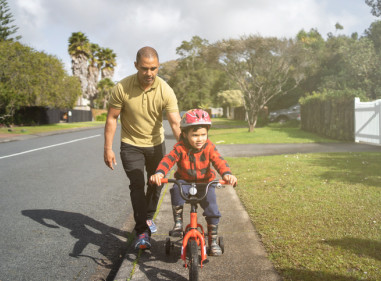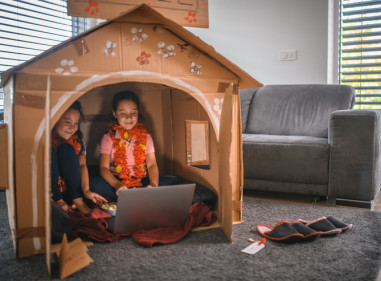
Planning & budgeting
Saving & investing
KiwiSaver
Tackling debt
Protecting wealth
Retirement
Home buying
Life events
Setting goals
Money tracking
Plan your spending with a budget
Getting advice
Studying
Get better with money
What pūtea beliefs do you have?
How to build up your emergency savings to cover unexpected costs
How to save your money
How to start investing
Find a financial adviser to help you invest
Your investment profile
Compound interest
Net worth
Types of investments
Term deposits
Bonds
Investment funds
Shares
Property investment
How KiwiSaver works and why it's worth joining
How to pick the right KiwiSaver fund
Make the most of KiwiSaver and grow your balance
How KiwiSaver can help you get into your first home
Applying for a KiwiSaver hardship withdrawal
How to use buy now pay later
What you really need to know before you use credit
How to get out of debt quickly
Credit reports
Know your rights
Pros and cons of debt consolidation
Credit cards
Car loans
Personal loans
Hire purchase
Student loans
Getting a fine
What happens if I start to struggle with moni?
How to build up your emergency savings to cover unexpected costs
Cryptocurrency
How to protect yourself from fraud and being scammed
About insurance
Insurance types
Insuring ourselves
Wills
Enduring powers of attorney
Family trusts
Insuring our homes
Losing a partner
Redundancy
Serious diagnosis
How to cope with the aftermath of fraud
Separation
About NZ Super – how much is it?
When you’re thinking of living in a retirement village
How to plan, save and invest for retirement
Manage your money in retirement
Find housing options in retirement
Four approaches to spending in retirement
Planning & budgeting
Saving & investing
How to build up your emergency savings to cover unexpected costs
How to save your money
How to start investing
Find a financial adviser to help you invest
Your investment profile
Compound interest
Net worth
Types of investments
Term deposits
Bonds
Investment funds
Shares
Property investment
View all
KiwiSaver
Tackling debt
How to use buy now pay later
What you really need to know before you use credit
How to get out of debt quickly
Credit reports
Know your rights
Pros and cons of debt consolidation
Credit cards
Car loans
Personal loans
Hire purchase
Student loans
Getting a fine
What happens if I start to struggle with moni?
View all
Protecting wealth
How to build up your emergency savings to cover unexpected costs
Cryptocurrency
How to protect yourself from fraud and being scammed
About insurance
Insurance types
Insuring ourselves
Wills
Enduring powers of attorney
Family trusts
Insuring our homes
Losing a partner
Redundancy
Serious diagnosis
How to cope with the aftermath of fraud
Separation
View all
Retirement
Home buying
Reading time: 3 minutes

The uncertainty that comes with losing a job or redundancy is a challenge, but leaving one role always opens up new opportunities for others.
The best thing we can do is be prepared.
By sticking to a budget and having savings set aside in an emergency fund, we’ll be better placed to cope with the initial shock and stress of losing a job.
Been made redundant? Step one after losing a job is to take a close look at the budget to see how the household can cope with reduced income. If you have an emergency fund or a redundancy payment, work out how long it will last.
Sorted’s budget planner can help you craft your plan. You can create multiple scenarios and even share yours with others to get on the same page.
There may be government help you can get after losing a job – check the Work and Income website.
There’s also information on dealing with redundancy on the Careers New Zealand website.
A financial mentor can help you navigate the support available. Get in touch with MoneyTalks to speak to someone about your situation.
Talk to your bank right away if you might have trouble meeting debt or mortgage repayments as a result of redundancy. They will have options they can talk through with you. Try not to miss a payment before getting in touch.
If you have repayment insurance as part of a personal loan or hire purchase agreement it may cover payments if you are made redundant. Check the policy document for details.
Redundancy insurance is also available on its own or as an add-on to life insurance – check your policies to see if they include this type of cover.
For more information about insurance, head to our guide on the different types.
Your employment contract will state if you’re entitled to a redundancy payment and how much it would be.
Find out more about employee rights in the event of losing a job on the New Zealand at Work website.
Being prepared before it happens can be a big help when facing redundancy. A great way to start preparing is to get your emergency fund set up.
Over time, ideally, we should aim to save up two to three months’ expenses for an emergency fund we can call on if we need it. You can start small and build up over time.
Work through the 6 steps to getting sorted to get yourself prepared for the future – whether things go smoothly or if you face some bumps in the road. When you're sorted you'll have the tools to cope with what life throws at you with confidence that you've got things covered.
Guide
Everyone needs an emergency fund. When things go pear-shaped, we need to cover ourselves and those we’re closest to. That’s…

Guide
Sometimes things go pear-shaped. If an earthquake strikes, our house burns down, our car is in a crash or we…

Guide
Since a home will probably be the biggest asset we own, we’ll need to protect it in case something unexpected…

Guide
Why do we need a will? People mainly use them to write down family members they want to provide for…

Guide
When we’re fit and healthy, it’s hard to imagine life changing. But what would happen if we couldn’t earn an…

Guide
When a relationship ends – especially later in life – it can entirely upend your money life. Separating couples often…

Guide
It can happen to anyone. Falling victim to a scam is far more common than we might think. Here we…

Guide
Losing a partner is no time to have to deal with money issues. Yet there is quite a lot to…

Guide
Life is full of risks of things that could happen – the house burning down, the car being stolen, illness…

Guide
Become a real-life superhero by arming yourself with the information you need to fight fraud and keep yourself, your family…

Use verification code from your authenticator app. How to use authenticator apps.
Code is invalid. Please try again
Don't have an account? Sign up
Or log in with our social media platforms


A free account gives you your very own space where you can save your tools and track your progress as you get ahead.
Or sign up using Google:


